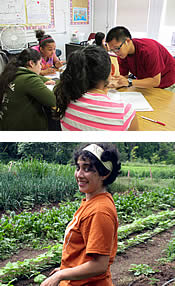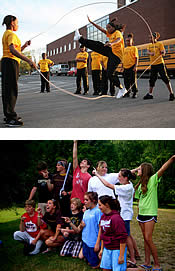
This article originally appeared on WKCD.org in Septemer 2010. At the time, “summer learning loss” was gaining prominence as another hurdle in the campaign to improve student achievement for all students. WKCD asked our teen journalist partners at the Indianapolis-based Y-Press to investigate best practices in summer learning programs, interviewing both experts in the field and students who were returning to school with summer learning experiences in their knapsack. The five student interviews—each as distinct as can be—are remarkable.
by Eric Chen, 17, Y-Press, Inc.
First posted September 17, 2010; re-posted May 29, 2013
LISTEN TO
Y-Press interviews with five teens about their summer learning experiences:
Brienne Colston, 17, Bronx, NY
Guadalupe Arce, 18, Dunn, NC
Jared Grinter, 11, Indianapolis, IN
Micaela Danker, 16, Wellston, OK
Priya Mirmira, 13, Zionsville, IN
INDIANAPOLIS, IN—Most education experts agree that summer learning programs benefit students in many ways—they often prevent losses in academic skills and knowledge over the course of the summer, and they provide extracurricular enrichment. For low-income children, they also provide meals and an outlet for physical activity. But summer learning doesn’t offer everything a child needs. All children require some downtime to flourish, one child expert cautions.
Summer learning programs are primarily aimed at stopping summer learning loss, which gained prominence as a national concern with the No Child Left Behind Act of 2001. The act, which advocated standards-based education reform, resulted in increased testing of students, particularly in the areas of math and reading.
Summer learning loss is especially pronounced in lower-income families, where studies have found that children often lose two to three months’ of learning over the summer, as measured by standardized tests in the fall.
Educator Earl Phalen, founder of the Summer Advantage USA learning program in Indianapolis, explained that such families are at a disadvantage on many levels. “If you’re a lower-income family, you may have less exposure. You may be going to take fewer trips, whether those trips are to the museum, whether those trips are to a play, to Chicago or to another town or city,” he said.
Low-income families also are less likely to have books in the home and less access to libraries and other enrichment opportunities, he said.
Learning loss is not a local problem but a national one, said Phalen, who pointed it out as one of the reasons why U.S. students keep losing ground to foreign students in math and science.
“You’ll find that those students are going to school on average 30 to 45 more days a year than our children are,” he said. “I think it’s necessary for our country to be competitive because even the best of our best students, quite frankly, when put up against other countries’ best, are not doing as well as they once did.”
Summer learning is crucial to increasing the academic performances of U.S. students, agreed Ron Fairchild, founding CEO of the National Summer Learning Association, a nonprofit organization based in Baltimore devoted to expanding summer learning opportunities for youth.
“We think that one of the keys to closing the achievement gap in this country is to make sure that all kids have access to learning opportunities during the summer so that it’s not the case that enrichment only happens for middle- and upper-income families but becomes the norm for … millions of kids in this country,” he said.
But Fairchild says only quality programs will stop summer learning loss. “If you provide a high-quality, comprehensive, six-week summer learning program to kids, there’s solid research evidence that shows that not only will those kids not experience loss, but they’ll actually experience a gain in reading and math performance,” he said.
Fairchild says the ideal program has both recreational and academic components. “I think the types of programs that we see that are the most successful are the ones that are the most comprehensive, and that are typically full-day programs that are chock full of all different types of activities for kids. And sure there’s an academic focus, but they’re mostly organized around themes.”
Best practices
Summer Advantage, for students in kindergarten through eighth grade, is a program that closely follows Fairchild’s model. Third-graders in his program posted measureable gains in math and language arts this year, Phalen reported. But there have been other benefits as well. “Equally important, it helps them gain the confidence about who they are and who they can become because of the exposures to the range of professions that our scholars get exposed to,” he said.
It’s this chance to explore that seems to be the biggest draw to summer learning, at least from students’ points of view. Micaela Danker, 16, of Wellston, Okla., went to a plethora of camps this summer, but she enjoyed every one because they focused on her interests: agriculture, student leadership and basketball.
Future Farmers of America, the national agriculture youth organization, is central to Micaela’s life, and many of the camps reflected her involvement with the group at the local and state levels. “I learned a lot of leadership skills — how to listen to others, how to serve others,” she explained. “It’s not all about having fun.”
Similarly, Brienne Colston, 17, of the Bronx, went to a summer program that allowed her to explore a subject that was not on her school’s curriculum: how power is used in goverment and society.
Her six weeks with the Sadie Nash Leadership Institute — a nonprofit that focuses on helping young women see their leadership potential through coursework, mentoring and service — were transformative. “After I completed the program, I felt so enlightened, so much smarter,” she said.
But Guadalupe Arce, 18, of Dunn, N.C., had quite the opposite experience. As the daughter of migrant workers from Mexico, she was enrolled at age 11 in a summer program to improve her English. “We barely did anything. I didn’t learn a thing. I went to it so my parents wouldn’t have to find a babysitter,” she recalled.
“Most of the students who were in the program were Hispanic. We talked to each other in Spanish.”
Finding a balance
 Kenneth R. Ginsburg, M.D., practices social adolescent medicine, and while he says summer is a great time for children to explore their interests, they need to have some downtime to process those experiences.
Kenneth R. Ginsburg, M.D., practices social adolescent medicine, and while he says summer is a great time for children to explore their interests, they need to have some downtime to process those experiences.
“Every kid needs a balance of play, of academics and of the kind of extracurriculars that allow them to figure out what makes their heart sing,” said Ginsburg, who is an associate professor of pediatrics at The Children’s Hospital of Philadelphia and University of Pennsylvania School of Medicine.
Unstructured play and leisure are critical to a child’s development, and it’s important not to lose track of them in the drive to address learning losses. “The job of childhood is play. That is the way people figure things out when they’re young,” Ginsburg explained. “It is actually an amazing opportunity to build your brain, to come up with creative thought, to come up with new ideas.”
For some children like Jared Grinter, 11, though, free time does not equal play. For the fifth-grader from Indianapolis, a summer program provided the balance to what might otherwise have been an idle summer in his apartment. “I really can’t go outside in the summer because I really don’t have anything to do. I just sit in the house, be bored, watch TV, sleep,” he said.
Through instruction, games and field trips, Summer Advantage gave Jared a chance to explore his two favorite subjects, reading and math. “I never went to summer school before and I thought it was going to be boring, but when I got there it was fun,” he said. “We got to play outside.”
Finding the right balance for each child will go a long way in addressing the problem of learning loss, Ginsburg said.
“When America is falling behind, it’s not just about academics; it’s about the fact that there are some areas where kids are getting kind of an inadequate education. And when that is the case, we absolutely need to do everything we can to increase their exposure to good education because every kid deserves that opportunity,” he said.
“But for those kids who are already blessed to have wonderful access to education, then we have to make sure they have other things in their life to balance it.”
And for those children, the downtime might be what’s missing.
“When kids feel pressured to perform for other people all of the time, whether that’s academics or whether that’s being overscheduled, then they’re not going to be having the time to find themselves and to kind of figure out some things on their own, which is really important to being resilient, to being able to bounce back from problems. It’s having some time to figure things out and to experiment with different solutions that play gives you,” Ginsburg said.
Ali Tahir, 15, and Naomi Farahan, 13, contributed to this report.



